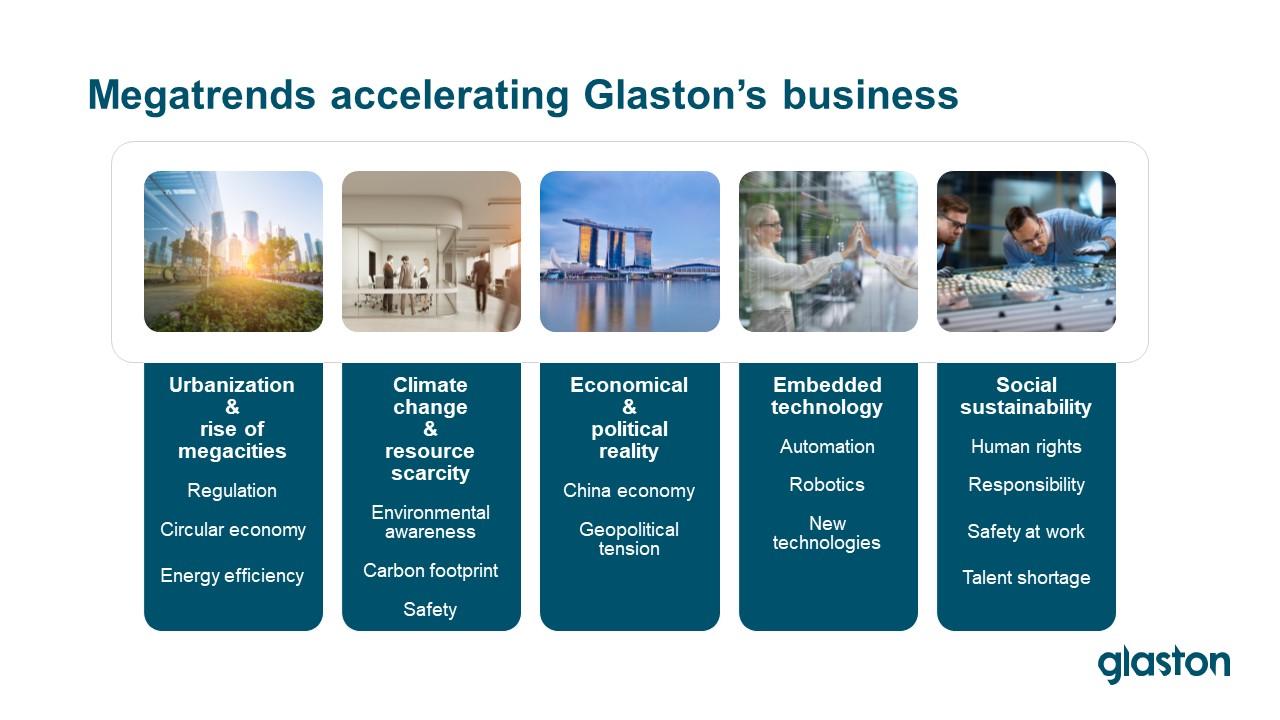Market Information
Operational Environment
Glaston is a frontrunner in glass industry technologies and services, responding globally to the glass processing needs of the architectural, solar, display and automotive industries. Demand for Glaston’s products and services is dependent on demand for glass and glass processors’ capacity. Glaston estimates annual addressable equipment market growth for architectural glass processing to gradually recover from -6% in 2023 back to approximately 5% during 2025−2026. The addressable equipment market for mobility, display and solar glass processing is expected to grow more than 5% each year.
Use of glass in construction is increasing through urbanization. Special requirements for glass are growing due to changing environmental factors, increasing safety regulations and energy-efficiency demands. In the automotive industry, the relative proportion of glass in vehicles is growing and use of thin glass, in particular, is increasing. Growth of solar energy, smart glass and energy-efficient glass is being supported by increasing environmental awareness and investments in renewable energy.
Glass processed using Glaston’s processing machines is supplied to the architectural glass, mobility glass, solar energy and display industries. Most of the glass produced with the company’s technology is supplied to the architectural glass industry.
Glaston operates in a global market, and the company’s business is to a large extent linked to trends in global investment demand.
Market
In 2023, the glass processing equipment markets developed unevenly: the Architectural markets slowed down while in the
Mobility, Display & Solar markets, the demand for automotive glass developed favorably, particularly in China.
Glaston has divided its market areas into EMEA, America, and APAC. The EMEA area has traditionally been a strong market for Glaston and in 2023, it generated approximately 52% of Glaston’s net sales. In 2023 Americas’ share of the company’s total revenue was approximately 33% and APAC’s share 15%.
In 2023, a market slowdown for architectural glass was noted in the EMEA area as of the second quarter and demand for Insulating Glass and Heat Treatment equipment weakened. As a result of economic uncertainty due to higher interest rates and limited investments, the overall market sentiment weakened in Europe.
In Europe, production started to slowly increase as the automotive industry recovered from the chip shortages and energy price increases, but was way below the pre-covid levels. As glass processors were not yet operating at full capacity, or only for a short time, investments remained modest.
In China, the architectural glass market was soft throughout 2023, with low demand for tempering and laminating lines. Despite the difficult market conditions, demand for high-end Insulating Glass equipment was good. Elsewhere in the APAC region, the markets for new machines were subdued.
In China, strong expansion in the vehicle market was noted with production approximately 10% higher than before the COVID-19-pandemic and almost as big as North America and Europe combined.
In the architectural glass market, the Americas performed well throughout year 2023. The commercial markets continued to be strong whereas the residential markets were slower throughout the year. In the US, investments were driven by the new energy regulations, and positive market traction was noted for Insulating Glass technologies, enabling better insulation
properties.
In North America, the market continued strong outside of the traditional automotive market, i.e. for special products such as recreational vehicles (RVs) and heavy vehicles. The cautious signs of market recovery in South America continued.
Competitors
The glass technology market is still fragmented and Glaston has many competitors. However, due to the challenging market situation, consolidation has accelerated in recent years.
The glass processing technology market is highly fragmented, with many small players manufacturing and selling machines and solutions to different parts of the flat glass processing chain.
The market can be divided into the high-end segment, mid-market segment and low performance segment in accordance with the customers’ quality and performance standards for the product. Glaston’s main addressable markets are the high-end and mid-market segment. Glaston estimates that in the high-end market segment, the customers have the highest requirements for machine capacity, uptime and services, as well as the highest quality requirements for the end product.
In the mid-market segment, the glass processors are usually regional or local processors and the quality requirements for the end product are lower than in the high-end segment.
Glaston’s main competitors are from Europe, China and Japan. For heat treatment equipment, Glaston’s main competitors are from China, for insulating glass equipment, the main competitors are from Central Europe and for automotive equipment, the main competitor is located in Japan.
In the Services business area, Glaston’s customer service network is the sector’s most extensive both geographically and in terms of personnel. There are more than 20 service locations. In addition, the service range provided by the Services business is the most comprehensive in the sector. Glaston’s comprehensive Glaston Care service agreements distinguish Glaston from its competitors. Maintenance services are available for every stage of the life cycle of products.
